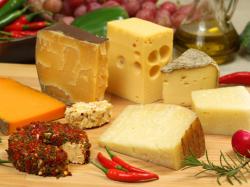Gala Tasting & Art Event Aim To Celebrate 25 Best Cheeses Of Wisconsin
April 11, 2011 | 2 min to read

MADISON, Wis. – Wisconsin Cheese Originals is celebrating the rise of farmstead, artisan and specialty cheeses in America’s Dairyland by hosting a gala tasting and art event on Saturday, April 16 at Olbrich Botanical Gardens in Madison.
Each attendee of the 25 Best Cheeses of Wisconsin Gala Tasting will take home an exclusive 2-x3-foot original art print, designed specifically for the event and suitable for framing. The print showcases a professional glamour shot of 25 full wheels and wedges of cheese from 25 different Wisconsin artisan cheesemakers.
Held from 6 p.m. to 8:30 p.m. at Evjue Commons inside Olbrich Botanical Gardens, tickets are $35, with all tickets sold in advance at www.wisconsincheeseoriginals.com. Attendees can expect to taste an array of artisan cow, sheep and goat’s milk cheeses, including several World and U.S Champions. The complete list of cheeses will be unveiled at the event.
Also featured will be complimentary appetizers by Bunky’s Café and live acoustic Irish music by Ken Fitzsimmons and Kevin Youngs from The Kissers. Attendees are welcome to walk the outdoor gardens before, during or after the event for free.
The event aims to celebrate the growing number of farmstead, artisan and specialty cheeses made in Wisconsin. A portion of all proceeds go toward annual beginning cheesemaker scholarships. Past scholarship recipients include Katie Hedrich, now a U.S. Champion Cheesemaker at LaClare Farm, and Rose Boero, a future goat’s milk cheesemaker in Custer, Wis.
Have Fun. Do Good. Eat Cheese. Wisconsin Cheese Originals shares information about Wisconsin artisan cheeses through a variety of events, all in the spirit of celebrating Wisconsin cheesemakers. It also offers an annual $2,500 scholarship to a beginning cheesemaker to help launch new artisanal cheeses. www.wisconsincheeseoriginals.com
Source: Wisconsin Cheese Originals
